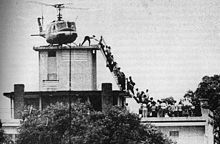Our friends Jim and Janet will be visiting Vietnam come June. And if they have the kind of experience that seemingly everyone who visits that country has, they are likely to come back marveling at the culture, the food, and the warmth of the people who we were at war with not so long ago.

Saigon fell in 1975, but Ken Burns thinks we’re still not over it.
After Saigon fell in 1975, though, I’m not so sure those of us at home ever fully reconciled with one another. Just a month ago I was party to an argument that I surely didn’t think I’d be hearing in 2017. It was about Jane Fonda, and her infamous trip to North Vietnam while the war was raging. There are those who despise her as a traitor, and those who will defend her to various degrees. This, more than 40 years after the war ended.
It was an unpopular war, one we lost, so the returning veterans didn’t get any ticker tape parades. And lots have had to fight—or are still fighting—for benefits and treatment that were owed them by the VA.
I was just old enough to remember the strife at home clearly. The war tore open a rift in my mom’s side of the family—one that they all carried to the grave. My sister, who was editor of the high school paper, was nearly expelled after she ran an anti-war poem. Hard-hat construction workers beat up long-haired demonstrators. And Kent State. And, and, and….
I was reminded of all this by a NY Times piece written by filmmakers Ken Burns and Lynn Novick titled Vietnam’s Unhealed Wounds. Burns and Novick are doing a documentary on the Viet Nam era that is soon to be released.
Here’s a passage from their article:
For more than a generation, instead of forging a path to reconciliation, we have allowed the wounds the war inflicted on our nation, our politics and our families to fester. The troubles that trouble us today — alienation, resentment and cynicism; mistrust of our government and one another; breakdown of civil discourse and civic institutions; conflicts over ethnicity and class; lack of accountability in powerful institutions — so many of these seeds were sown during the Vietnam War.
I think there’s a lot to the idea that a lot of current divisions are traceable to that time period. The older I get the longer view I take. I’m looking forward to the documentary. But it will be hard to watch.
While Mike’s reflections are thoughtful and balanced—and his suggestion that much of our present malaise can be traced to Vietnam’s unhealed wound is, at least for me, persuasive—his tacit assertion that reconciliation is/would have been/would be a good thing is surely open to examination. This is not a matter of burying a political hatchet as much as pursuing justice, a charge that is eternal. As long as my state’s office building bears of name of the man, may his memory be blotted out, largely responsible for the murders at Kent State, reconciliation is not just inconceivable but also morally obscene. Preserving a moral compass is immeasurably more important than restoring civility.
Thanks for reading, and for the comment. I’m with you in that civility for civility’s sake isn’t the overriding goal. That can be tantamount to fake manners. I take the idea of reconciliation along the lines of there can me multiple truths–not always, and not in every circumstance. I don’t think that reconciliation means burying the hatchet so much as seeking an explicit understanding of what other’s truths are. It’s a start. Again, thanks for weighing in.
I have also stumbled into the Jane Fonda argument. I had forgotten about that incident and was unprepared for the vitriol I was given. You are correct, it will be a tough watch.
Leave a Response